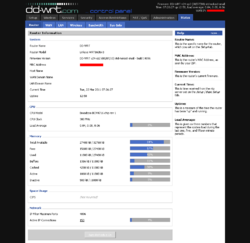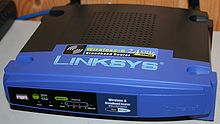- DD-WRT
-
DD-WRT 

DD-WRT's Web InterfaceDeveloper(s) Sebastian Gottschall / NewMedia-NET Stable release v24 SP1 (Build10020) / July 27, 2008 Preview release v24 preSP2 / July 22, 2009 Operating system Linux Type Router operating system Website www.dd-wrt.com DD-WRT is a Linux-based firmware for several wireless routers, most notably the Linksys WRT54G (including the WRT54GL and WRT54GS). Like other similar projects, DD-WRT is third-party firmware designed to replace the firmware that ships pre-installed on many commercial routers. This is done for a variety of reasons including the addition of features which are not typically included in a manufacturer's router firmware.
DD-WRT includes such features as support for the Kai network, daemon-based services, IPv6, Wireless Distribution System, RADIUS, advanced quality of service, radio output power control, overclocking capability, and software support for a Secure Digital Card hardware modification.
Buffalo Technology and other companies have shipped routers pre-installed with a customized version of DD-WRT.[1][2]
Contents
Code development
DD-WRT versions up to v22 were based on the Alchemy firmware from Sveasoft, which in turn is based on the original Linksys firmware. DD-WRT versions from v23 onwards, however, are almost completely rewritten. The Linux kernel part is based on the OpenWrt kernel, which started as Linksys-based firmware but was later changed to its own build framework. All of the firmware is based on Linux, as are OpenWrt and Alchemy.
Releases
The major releases to date include:
DD-WRT v23 Service Pack 1 (SP1) was released on May 16, 2006. Much of the code was overhauled and rewritten during the development of this release, and many new features were added.
DD-WRT v23 Service Pack 2 (SP2) was released on September 14, 2006. The interface was overhauled, and some new features were added. Some additional router models are supported, with more planned.
DD-WRT v24 was released on May 18, 2008. It allows up to 16 virtual interfaces with different SSIDs and encryption protocols. There is support for some PowerPC, IXP425-based router boards, Atheros WiSOC and X86 based systems. There is also limited support for routers with low flash memory (ex. WRT54Gv8 or WRT54GSv7).
DD-WRT v24 Service Pack 1 (SP1) was released on July 26, 2008. Urgent DNS security issue fixed for dnsmasq, Site Survey security fixes, longer passwords, and flexible OpenVPN configurations. New hardware supported, including WRT300 v1.1, WRT310N, WRT600N, Tonze AP42X Pronghorn SBC, Ubiquiti LSX and Netgear, Belkin and USR devices.
DD-WRT v24 Service Pack 2 (SP2) is in development at the time of this writing (23:47, 21 August 2010 74.132.217.73).
Features
List of features in all versions[3]
Micro
(2 MB)Mini Nokaid Standard VOIP VPN* Mega**
(8 MB)Access Restrictions Yes Yes Yes Yes Yes Yes Yes AnchorFree Yes Yes Yes Yes Yes Yes Yes Bandwidth Monitoring Yes Yes Yes Yes Yes Yes Yes ChilliSpot Yes Yes Yes Dynamic DNS Yes Yes Yes Yes Yes Yes Yes HTTPS Support for Web Management Yes Yes Yes Yes Yes IPv6*** Yes Yes Yes Yes Yes JFFS2* Yes Yes Yes Yes No[4] Yes XLink Kai (kaid) Yes Yes MMC/SD Card Support Yes Yes Yes Yes Yes NoCat Yes Yes Yes Yes Yes OpenVPN Yes Yes PPTP/PPTP Client Yes Yes Yes Yes Yes Yes Quality of Service Yes Yes Yes Yes Yes Yes Yes IPv6 Router Advertisement Daemon (radvd) Yes Yes Yes Yes Yes Yes Linking Routers/Repeater/mBSSID Yes Yes Yes Yes Yes Yes Yes RFlow (Traffic Information) Yes Yes Yes Yes Yes Samba/CIFS client Yes Yes Yes Yes Yes Milkfish SIP Router Yes Yes SNMP Yes Yes Yes Yes Yes SPI Firewall/IPtables Yes Yes Yes Yes Yes Yes Yes SSHd Yes Yes Yes Yes Yes Yes Telnetd Yes Yes Yes Yes Yes Yes Yes Transmit (Tx) power adjust Yes Yes Yes Yes Yes Yes Yes UPnP Yes Yes Yes Yes Yes Yes Yes Wake On LAN Yes Yes Yes Yes Yes Yes Yes WPA/WPA2 Personal/Enterprise Yes Yes Yes Yes Yes Yes Yes Wiviz Yes Yes Yes Yes Yes Yes * Smaller VPN JFFS builds are available for 4MB units: downloads/others/eko ** Only on DD-WRT v24 (8MB+ flash required) *** IPv6-related features do not work by default in DD-WRT v24.[5] Note: It is possible to build your own custom firmware package with the
feature-set you want, working within the limitations of available ROM[6]ROM Requirements: • All versions require 4 MB of flash unless noted otherwise • Micro+ requires 2 MB of flash + 128K CFE Controversy
DD-WRT describes itself as third-party-developed firmware released under the terms of the GPL.[7] However, some of DD-WRT's firmware include components that are not licensed under the GPL[8].
In July 2006, the DD-WRT Shop started offering a commercial version of the router firmware built with additional, non-open source code.[9] It includes increased functionality such as per-user bandwidth control. Also around that time, the license text was changed to specify that some software components were not licensed under the GPL.[citation needed]
The person who released the proprietary version wrote a response to these allegations in his blog and stated that the source code was in fact available.[10] The license text was reverted back to the unmodified GPL license.
Security issues
A Remote Command Execution vulnerability in DD-WRT's HTTPd server was found by a Bulgarian hacker on July 21, 2009 and was patched within a few hours after being documented on milw0rm. [11] However, all prior DD-WRT versions (before build 12533 of V24 preSP2) remain vulnerable to this exploit.
See also
- List of wireless router firmware projects
References
- ^ "Buffalo Partners with NewMedia-NET" (Press release). 23 October 2007. http://www.buffalo-technology.com/press/releases/buffalo-partners-with-newmedia-net/. Retrieved 14 November 2007.
- ^ Gottschall, Sebastian [BrainSlayer] (29 October 2007). "Congratulations on the partnership w/Buffalo!". http://www.dd-wrt.com/phpBB2/viewtopic.php?p=121822&highlight=#121822. Retrieved 14 November 2007.
- ^ Feature Matrix, (by firmware version).
- ^ JFFS2 support removed from OpenVPN builds.
- ^ IPv6 on v24 - DD-WRT Wiki
- ^ Firmware Modification Kit gives the user the ability to make changes to a firmware image without recompiling the firmware sources.
- ^ "What is DD-WRT?". http://www.dd-wrt.com/wiki/index.php/What_is_DD-WRT%3F. Retrieved 27 November 2008.
- ^ Weiss, Aaron (April 23, 2009). "The DD-WRT Controversy". WiFi Planet. http://www.wi-fiplanet.com/columns/article.php/3816236. Retrieved April 8, 2011.
- ^ "DD-WRT v23 SP2 Special". DD-WRT Shop. 13 July 2006. http://www.dd-wrt.com/shop/catalog/product_info.php?cPath=22&products_id=31. Retrieved 23 September 2007.
- ^ Gottschall, Sebastian (11 February 2007). "DD-WRT response to accusations". http://dd-wrt.blogspot.com/2007/02/as-we-see-jeremy-collake-is-still-alive.html. Retrieved 5 October 2007.
- ^ "http://svn.dd-wrt.com:8000/ticket/1167". http://svn.dd-wrt.com:8000/ticket/1167.
External links
Routing software Free software Commercial software - Cisco IOS
- Junos
- RouterOS
- SmoothWall
- Vyatta
Others Related articles - Comparison of firewalls
- List of router or firewall distributions
Categories:- Aftermarket firmware
- Free system software
- Routing software
Wikimedia Foundation. 2010.

